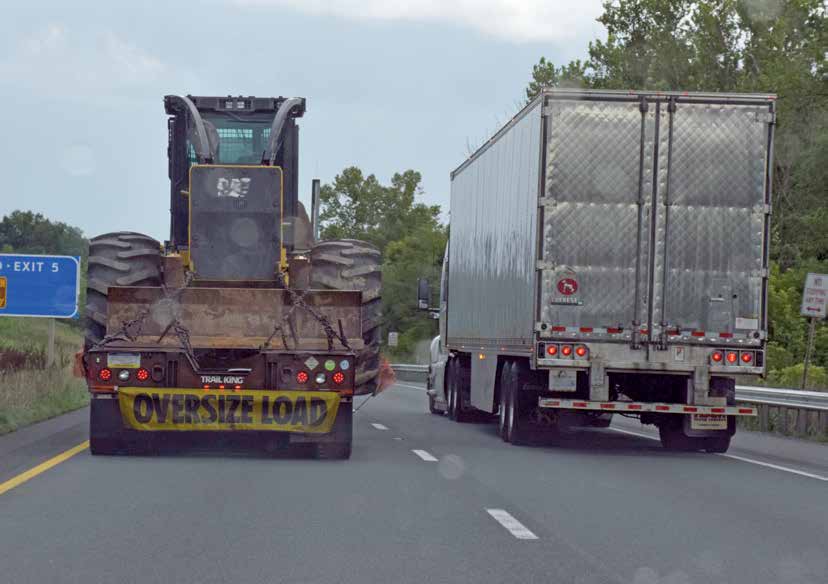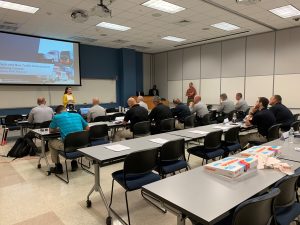
Buses and large trucks, including dump trucks and tow trucks, commit moving violations that put themselves and motorists at risk, including, most commonly, distracted driving, tailgating, improper lane changes, speeding, and impaired driving.
 Some commercial motor vehicle (CMV) drivers, particularly those operating dump trucks, are paid by the trip, making the drivers more likely to disregard traffic rules in an effort to decrease the time spent on each trip. In addition, compared to passenger vehicles, trucks have much longer stopping distances. In particular, wet and slippery roads create greater disparities between the braking capabilities of large trucks and passenger vehicles. As a result of their high center of gravity, large trucks and buses are also at a higher risk of rolling over. In 2017, 48 percent of deaths among occupants of large trucks occurred when vehicles rolled over.
Some commercial motor vehicle (CMV) drivers, particularly those operating dump trucks, are paid by the trip, making the drivers more likely to disregard traffic rules in an effort to decrease the time spent on each trip. In addition, compared to passenger vehicles, trucks have much longer stopping distances. In particular, wet and slippery roads create greater disparities between the braking capabilities of large trucks and passenger vehicles. As a result of their high center of gravity, large trucks and buses are also at a higher risk of rolling over. In 2017, 48 percent of deaths among occupants of large trucks occurred when vehicles rolled over.
In 2017, 4,889 large trucks and buses were involved in fatal crashes in the United States, an increase of 9 percent over the number of fatal incidents in 2016. Since 2009, fatal crashes involving large trucks and buses have increased by 42 percent. Crashes resulting in injury increased by 62 percent from 2009 to 2015 and by 4 percent from 2016 to 2017. Due to these increases, law enforcement agencies should prioritize traffic enforcement on large trucks and buses in their jurisdictions.
All law enforcement officers have the authority to enforce large vehicle traffic infractions, even if they are not certified CMV inspectors. However, even though the need for sustained enforcement is clear—not only for CMV drivers, but also for passenger vehicle motorists operating aggressively around these large vehicles—the resources and training that law enforcement agencies use for traffic enforcement are being reduced in many jurisdictions due to budget constraints and shifting community priorities.
 and Dates ■ Olympia, Washington—July 18, 2019 |
In partnership with the Federal Motor Carrier Safety Administration (FMCSA), the IACP provided a one-day, no-cost Large Truck and Bus Traffic Enforcement training in nine states across the United States to increase local officers’ knowledge about the importance of conducting enforcement actions on large trucks and buses.
The one-day training included two sessions:
1. General Enforcement (2 hours): This session is geared toward the everyday frontline officer who may be hesitant to stop CMVs.
2. Train-the-Trainer (4 hours): This session trains officers who may already have experience dealing with CMVs and would like to teach the material to others.
During this training, officers were presented with tools and strategies to effectively conduct traffic stops on large trucks and buses. The training included a PowerPoint presentation with video scenarios on how to safely make a stop, how to cite and report a stop, and how to interact with the driver. Many officers have admitted discomfort or lacking the knowledge to enforce traffic stops on CMVs; reasons for this hesitancy vary from safety concerns to a lack of training or a lack of understanding of state laws regarding CMV violations. Throughout the training, the messaging was clear: all an officer needs to request during a CMV traffic stop is the driver’s license, registration, and proof of insurance.
The IACP and FMCSA held a post-training roundtable discussion using feedback and common themes found throughout the Large Truck and Bus Traffic Enforcement trainings. The purpose was to hear from those agencies who received the training, identify challenges for law enforcement officers who may be reluctant to enforce traffic laws on large trucks and buses, and develop ideas for strategies and resources to address these issues.
Based on information gleaned from the roundtable, the IACP is developing an article that will be featured in a future issue of Police Chief, listing common themes and recommending resources to produce for the field regarding traffic enforcement for CMVs. The IACP is devoted to addressing global traffic safety and will continue to produce materials and tools in partnership with federal partners at the Department of Transportation to reduce crashes and their related fatalities, injuries, and traffic congestion. 🛡
Please cite as
Cari Jankowski and Breana McKenney, “Large Truck and Bus Traffic Enforcement Training,” IACP@Work, Police Chief 86, no. 12 (December 2019): 76–78.


